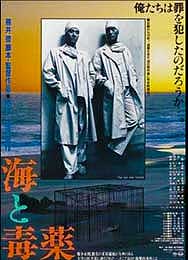Not a very good movie, I’m afraid, although this Japanese made depiction of wartime cannibalism is reasonably striking with its restrained yet startlingly graphic approach.
LUMINOUS MOSS (HIKARIGOKE; 1992) was adapted from a 1954 novella by Taijun Takeda that used an incident of cannibalism to examine civilized man’s attitudes toward violence, illuminated in a play the novel’s inquiring protagonist writes about the incident.
Director Kei Kumai was certainly no stranger to horrific material, having previously adapted Endo’s notorious novel THE SEA AND POISON, about the torture-murder of an American serviceman by Japanese surgeons, into an equally controversial 1986 film. LUMINOUS MOSS is just as gruesome, though far lesser known.
In 1991 a novelist on a research trip is shown a cave filled with moss that emits an eerie green illumination. The writer is also informed of a WWII incident in which the crew of a battleship became stranded in a secluded island cave for three months. The lone survivor was initially hailed as a hero, but that changed when the bones of one of his crewmen were discovered packed into a box, suggesting that the flesh had been cannibalized.
The writer becomes obsessed with the case, and constructs his own version of what occurred all those years ago. Much of the remainder of the film is taken up with the writer’s imagined dramatization, in which the stranded crewmen, suffering from extreme cold and starvation, are forced to cut the flesh from the bodies of their deceased comrades and eat it–and in one case kill a man outright so there will be flesh to consume. Afterward a greenish halo appears around the heads of those who partook (an element created by the writer in memory of the luminous moss he viewed earlier).
The surviving captain’s imagined trial follows, in which he pleads innocent to the crime of cannibalism and argues that he’d prefer to be judged only by those who themselves have eaten human flesh and/or had their own flesh eaten. Naturally the judge and prosecuting attorney disagree, and it seems as if the captain is going to be found guilty—but then the sounds of bomber planes flying overhead are heard, and the courtroom is cleared, leaving the captain alone with his increasingly horrific memories.
From a visual standpoint this film lacks the formal beauty that characterized director Kei Kumai’s better known effort THE SEA AND POISON, being rather staid and uninspired in its visual design. I’ll at least give the film credit for its unsparing take on cannibalism that straddles but never quite crosses the line between art and exploitation. That doesn’t get Kumai off the hook, however, for the supremely odd and confusing structure, taken up as it is largely with an extended figment of its protagonist’s imagination (it’s the reason the concluding trial grows increasingly surreal). The precise nature of that fantasy will be incomprehensible to anyone who hasn’t read the source novel, whose avant-garde nature didn’t transfer to the screen.
Another problem is the stagy nature of much of the film, which is taken up largely with men talking about partaking in cannibalism. Kumai might have done better to structure the proceedings as a play (as was done in the novel) rather than as the lengthy flashback presented here. As it is LUMINOUS MOSS essentially plays like a horrific version of the Clint Eastwood directed LETTERS FROM IWO JIMA, which in any event was a far more satisfying movie overall.
Vital Statistics
LUMINOUS MOSS
Film Crescent/Neo Life
Director: Kei Kumai
Screenplay: Taro Ikeda, Kei Kumai
(Based on a novella by Taijun Takeda)
Cinematography: Masao Tochizawa
Editing: Osamu Inoue
Cast Rentaro Mikuni, Taketoshi Naito, Hisashi Igawa, Satoko Iwasaki, Eiji Okuda, Chishu Ryu, Tetta Sugimoto, Kunie Tanaka, Masane Tsukayama


